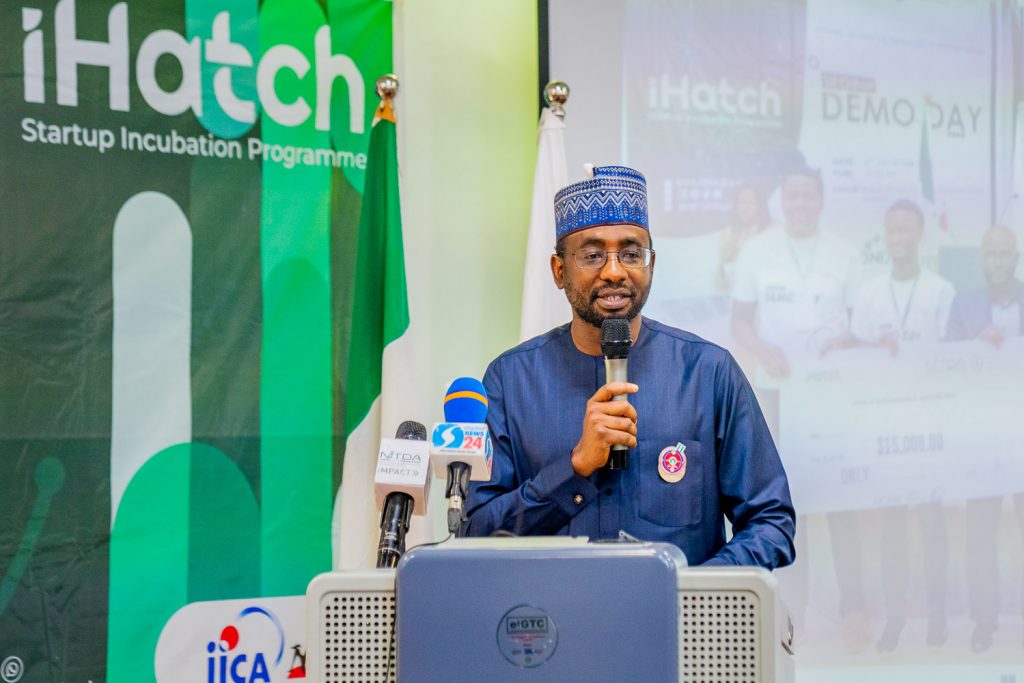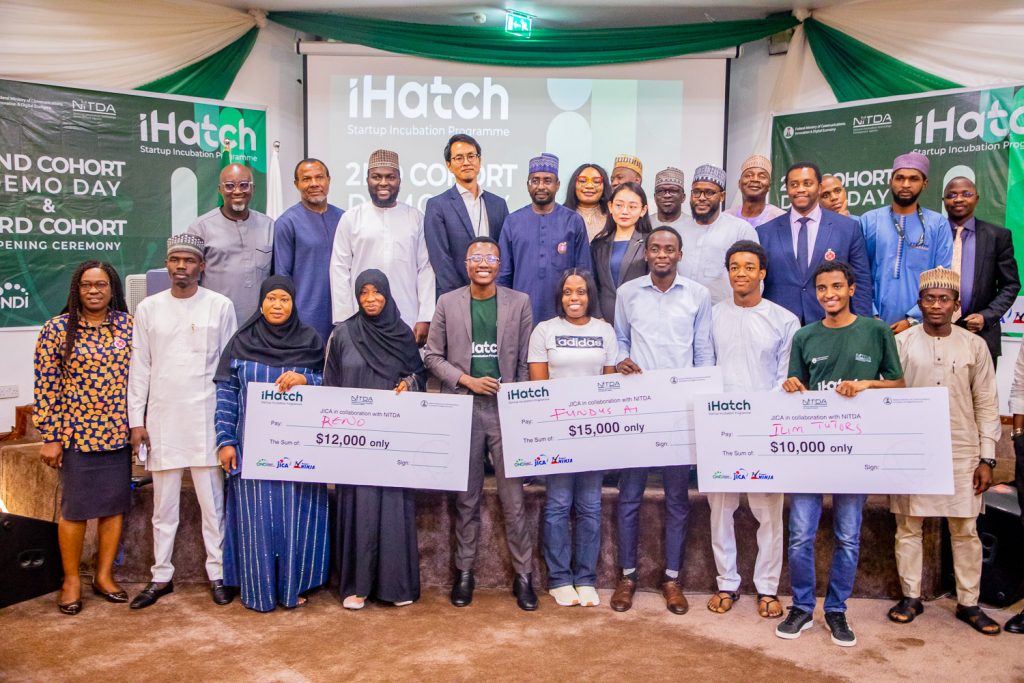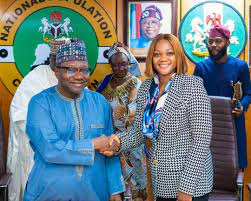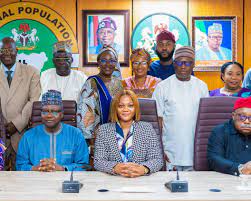Opinion
NDLEA and Drive for Global Reach
Published
1 year agoon
By Emmanuel Onwubiko
“Every man’s work is a portrait of himself”.
-Cyril Chukwudi Ibe;
“Still in search of a fine mind”.
The above citation from a tiny book written way back, takes us to the profoundly scholarly observation that was made by Mark H. McCormack in one of his fantastic books titled “What they don’t teach you at Harvard Business School”.
Obviously, Mark McCormack has a reputation as the writer of this famous international bestseller which fills the gap between a business school education and the knowledge that comes from day-to-day experience of running a successful business and managing people.
As we settle down in this reflection to focus on the multidimensional steps that the Executive Chairman of the National Drugs Law Enforcement Agency (NDLEA) Brigadier-General Mohammed Buba Marwa (CON) rtd, has adopted to attract global attention to the anti-drug war currently going on under the administration of president Muhammadu Buhari, we will do justice to this write up by drinking from the rich fountain of wisdom erected by the author Mark H McCormack.
The aforementioned author wrote thus: “As we have seen, your secretary is your official link with the outside world and how she deals with it is a mirror image of how the outside world sees you. If she is abrupt, you are perceived to be abrupt.
If she drops confidential information you are perceived to drop confidential information. If she drops names on your behalf, you are perceived as a name dropper. If she is officious and overbearing, then you are thought to be officious and overbearing.”
The author argued further that the secretary of a leading British television executive consistently makes it impossible for me to arrange any sort of meeting with her boss. On countless occasions, I have tried to arrange a get-together at any time during the next two weeks only to have his secretary tell mine that he is always ‘too busy. Yet without fail, when I get to the man directly, meetings are easy to arrange.
Of course, secretaries, he said, do play a certain protective role. By screening you from others, they enable you to act rather than react to a variety of business situations. However, there is a whole range of positive and negative ways in which this screening can be done. It is often as simple as the difference between saying. Who may I say is calling?’ and Who’s this?
The author also observed that: “Secretaries often come off as drill sergeants, and I have seen executives who are amused by their abrupt manner and even encourage it. I suspect that those who do think that the abruptness makes them appear that much more important.
Of course, this applies to all subordinates. If they work directly for you, it is likely that you are being judged at least partially by how they present themselves. So if you become aware of obvious rough edges, it is in your self-interest to point them out.”
The above narratives of a secretary can be referred to as a metaphor of how the management and staff of the NDLEA has through the dint of good example by their head, continue to exhibit compulsive and merit based services to the motherland through their well coordinated combat against drug barons in Nigeria and by extension, the Chief executive officer of NDLEA has deliberately launched a global wide advocacy drives to seek for international working partnership with some of the best authorities in the battles against transnational hard drug trafficking.
These deliberate global wide advocacy campaigns against hard drugs and the fruitful search he has so far actualized to get agreements entered into with international bodies and many other nations of diverse continents on exchange of intelligence on movements of hard drugs, will remain one of the best moves made by Nigeria in over fifty years to battle and combat the scourge of drugs. There is gainsaying the fact that hard drugs trafficking is an international crime that go beyond the shores of Nigeria and because Nigeria is not a producing nation for harddrugs, it is however a transit nation. This demands that all hands must be on deck to uproot these traffickers and barons both from within and without.
Only recently, Nigeria and India have agreed to exchange vital intelligence on the activities of drug trafficking syndicates operating vulnerable drug routes between both countries, while the latter will also strengthen the capacity of NDLEA officers with training.
This was part of recommendations and agreements reached at the end of a two-day bilateral meeting held in New Delhi, India between an NDLEA delegation led by its Chairman/Chief Executive, Brig. Gen. Mohamed Buba Marwa (Retd) CON, OFR and its India counterpart, Narcotics Control Bureau, NCB, led by its Director General, Mr. Satya Narayan Pradhan.
The meeting also recommended exchange of best practices in drug demand reduction and sharing of real time information on the involvement of nationals of both countries in drug trafficking as well as conducting joint operations, while agreeing to hold another bilateral meeting in Nigeria in 2023. Another key objective of the India meeting was the collaboration between NDLEA and NCB on how to control the importation of tramadol above 100mg as well as certain categories of precursors into Nigeria.
In his presentation at the talks, Marwa expressed gratitude to NCB and its management for the warm reception accorded his delegation. He underscored the importance of the meeting to the global action against drug trafficking given the historical antecedents of both countries, the commonality of language, legal systems, population and the existing robust trade relations. He reiterated the need for strengthened collaboration between the two agencies in the fight against illicit drug cultivation, production and trafficking. While highlighting Nigerias drug use and trafficking challenges, he noted the increased national efforts to adopting a balanced approach to addressing both the drug supply and demands reduction.
He further underlined the importance of international cooperation and stakeholders’ engagement, adding that Nigeria has a National Drug Control Master Plan as the veritable tool to drug control and enforcement, which has facilitated effective co-ordination at federal and state levels and is being encouraged at the local government level.
He expressed the hope that a Memorandum of Understanding, MoU, that would define the relationship between the two agencies with reference to information sharing, assets tracing and forfeiture of assets found to be connected to, and/or proceeds, of drug trafficking would be finalised soon.
In his remarks, Mr. Satya Narayan Pradhan of NCB, head of Indian delegation welcomed the delegations of both countries for the meeting, while he highlighted the issues particularly the trafficking of Heroin and Amphetamine Type Stimulants (ATS) in the country. He said that the drug trafficking through maritime and air route is a challenge for both countries.
He elaborated on trends showing the emergence of illicit drug trafficking through couriers, dark-net markets and social media platforms with a promise to share the information about the latest mechanism and technologies to fight the emerging threats.
Those on the NDLEA delegation include: Mrs. Eucharia Ngozi Eze, Minister- Counsellor, High Commission of Nigeria, New Delhi; Mr. Joseph Nbona Sunday, Director Prosecution and Legal Services of the Agency; Mr. Ahmad Tijani and Mr. Hamza Umar, Commandant, NDLEA Academy. The NCB team led by its DG had nine other officers of the Bureau at the meeting.
Besides, the National Drug Law Enforcement Agency (NDLEA) and the International Criminal Police Organisation, popularly known as Interpol, have signed a Memorandum of Understanding (MoU) that will enable the anti-narcotics outfit contribute to the pool of global criminal data and also access records of 195 countries around the world.
NDLEA Chairman/Chief Executive, Brig.-Gen. Mohammed Buba Marwa (rtd) signed for the agency, while the Assistant Inspector General of Police in charge of National Central Bureau and Vice President, Interpol Africa, Garba Baba Umar, endorsed the document on behalf of the global body.
Speaking at a brief ceremony at the National Central Bureau (NCB) Secretariat, Force Headquarters, Abuja, yesterday, Marwa reminded the audience that drug business is international in scope, while the scourge of substance abuse has continued to destroy lives, youths, families and communities, stressing that it also fuels criminality, as perpetrators either consume illicit substances or use proceeds to fund their nefarious activities.
His words: “As we are after the drug cartels and barons, we are not under the illusion that they won’t be after us. But, we are always steps ahead of them. This is why all security agencies must collaborate to fight the cartels, whether in Nigeria or anywhere in the world. We are, therefore, happy that the signing of this MoU allows us access to contribute and benefit from criminal records of 195 countries globally.”
He commended the Inspector General of Police, Alkali Baba Usman, for his leadership acumen and commitment to the anti-drug crusade in Nigeria, citing the IGP’s memo to all police formations nationwide to always transfer drug cases to NDLEA across the states for investigation and prosecution, as a mark of cordial collaboration.
Earlier, AIG Garba Umar lauded Marwa for transforming NDLEA to a groundbreaking agency within a short time of assumption of office. He called for more support for the anti-narcotics agency.
He highlighted the significance of the pact to the success of NDLEA operations and pledged the full support of Interpol at all time.
Importantly, impressed by the high standards that the current hierarchy of NDLEA has set in the fight against drugs, the United Kingdom says it will provide £1 million worth of support to enhance the operations of the National Drug Law Enforcement Agency, (NDLEA) in 2022 and additional provision over a period of three years.
Nick Fowler, the director of home office international operations, said this when he led a team on a courtesy visit to Buba Marwa, the NDLEA chairman, at the headquarters on Friday in Abuja.
In a statement by Femi Babafemi, director, media and advocacy of the NDLEA, Fowler commended Marwa for the success that the agency has recorded under his leadership.
Fowler said the agency had been able to play a significant role by intercepting loads of illicit drugs going to the UK.
He said his office was well positioned to share intelligence with NDLEA.
He also assured that the British government was willing to enhance NDLEA’s operations with provision of strategic equipment, logistics and training.
These, he said, were part of the £1million plan, to be implemented in 2022 with additional support over the next three years.
Earlier, Marwa expressed appreciation to the visiting UK team and the British government for the past support to NDLEA. He said with the expansion of the operations, command structure and staff strength of the agency, he would need more support and collaboration from the UK government.
He stated that the President Muhammadu Buhari-led government has been supportive to the agency in critical areas.
Marwa, therefore, asked for strengthened intelligence sharing collaboration, provision of essential operational logistics and training among others from the UK government.
The UK team was made up of Julie Hartfree, Africa regional director, and Kris Hawksfield, West Africa regional manager, both of the home office international operations. NAN
There is a popular African saying that good things have no hiding place, Nigeria was elected to host the next conference of Heads of Drug Law Enforcement Agencies Africa, HONLEA, in 2023. This was the unanimous decision of the regional network at the close of its 2022 annual meeting in Nairobi, Kenya at the weekend.
The move by other heads of anti-narcotics agencies in Africa to have Nigeria host the 2023 conference followed the country’s good relationship with others on the continent and NDLEA’s exemplary performance in the renewed fight against substance abuse and illicit drug trafficking.
In the course of the weeklong conference, Chairman/Chief Executive Officer of the National Drug Law Enforcement Agency, Brig. Gen. Mohamed Buba Marwa (Retd), CON, OFR, led the Nigerian delegation in presentations on every item of the agenda for discussion, where he shared the country’s experience and successes so far recorded in the drug war as a result of bilateral and multi-lateral cooperation with other stakeholders in Nigeria and partners at both regional and international levels.
On the sidelines of the conference, he also led his team in bilateral meetings with his counterparts from Kenya, Gambia, Ghana and South Africa on areas of mutual interests such as intelligence sharing, joint operations, training and exchange programmes, among others. The bilateral meetings also agreed on the setting up of technical working groups on both sides to work on Memorandums of Understanding that will formalize the partnerships and working relationships.
Marwa had in his discussions at the bilateral meetings emphasized the need to build new and strengthen existing partnerships among anti-narcotics agencies at the sub-regional and regional levels to make trafficking of illicit drugs and movement of drug lords difficult on the African continent.
The chairman of NDLEA has indeed demonstrated the universal truism that states as follows; “If I take care of my character my reputation will take care of itself.” as stated by D.L. Moody. It is the expectation of patriotic Nigerians that government currently and the government that would be elected, won’t take any toxic actions administratively and operationally, to take Nigeria back to the days that hard drugs trafficking was a pastime for men of the underworld who call the shots even within the corridors of power. These efforts of Marwa should and must be consolidated and made to become sustainable for a long period of time, long after the current hierarchy has served out her statutory tenures.
- EMMANUEL ONWUBIKO is head of the HUMAN RIGHTS WRITERS ASSOCIATION OF NIGERIA and was NATIONAL COMMISSIONER OF THE NATIONAL HUMAN RIGHTS COMMISSION OF NIGERIA.
You may like
Opinion
IHATCH: JAPAN GOVERNMENT TASK TO LEVERAGE NIGERIA’S YOUTHFUL POPULATION- DG NITDA
Published
5 months agoon
December 3, 2023
By James Ishaku
As part of the current administration of President Bola Tinubu’s commitment towards creating meaningful opportunities for Nigerian youths, the Director General Of the National Information Technology Development Agency (NITDA), Kashifu Inuwa CCIE has called on the government of Japan to leverage on the youthful population through strategic talent partnership that will nurture and build a workforce that can be exported.
The DG made the call at the Ihatch startup incubation programme 2nd cohort demo day and 3rd cohort opening ceremony organised by the subsidiary of the agency, Office for Nigerian Digital Innovation (ONDI), in partnership with Japan International Corporation Agency (JICA) in Abuja.
Inuwa noted that the ihatch 5-month free intensive incubation programme executed by the ONDI and hosted within the National Centre for Artificial Intelligence and Robotics (NCAIR) is designed to help Nigerian tech entrepreneurs refine their business ideas through a series of coaching, lectures, and booth camps to develop scalable and adaptable business models that willfocus on youth, innovation, entrepreneurship, and technology.
He added that the incubation programme will be held simultaneously in Abuja, Lagos, Port Harcourt, Gombe, and Kano and JICA has agreed to extend the Fourth Cohort across each of the 36 States and the FCT. This is to enable wider reach and to stimulate the startup ecosystems across the States.
The DG stated that not fewer than 1,218 applications were received for the Second Cohort and the number was pruned down to 8 startups, comprising 16 persons, a Founder and Co-Founder for each startup, after undergoing levels of rigorous selection process conducted by a panel of judges, comprising experts in diverse areas of technology and innovative entrepreneurship.
He explained that the selection process assessed the startups’ ideas based on the criteria of profitability, scalability, social impact, idea technique, competitive advantage, experience, and a clearly defined future roadmap.
Inuwa further revealed that a total of 11,183 applications were received from across the 6 geopolitical zones for the Third Cohort. This culminated in the selection of the top 8 startups, comprising 16 founders in total that will participate in the Third Cohort that was launched.
He added that 16 startups that participated in the first and second cohorts of the iHatch incubation programme have moved on to achieve remarkable success in the areas of job creation, funding, participation in events, and valuable partnerships which have created a combined total of 179 direct jobs in the span of agriculture, health, education, and e-commerce sectors.
The DG further asserted that apart from the total grant of US$45,000 (US$15,000 each) for Proof of Concept (POC) to the top 3 startups in the first cohort, some of the startups have raised some funding through other sources. Xolani Health (a health tech startup from the first cohort) secured a grant worth US$155,000, BetaLife (a health tech startup from the first cohort) secured an angel investment of US$60,000, Gifty (an e-commerce startup from the second cohort) got a grant of USD$8,000 while two other startups from the first and second cohorts respectively, raised a combined total grant of US$6,000.
Inuwa affirmed the agency’s commitment to working with relevant stakeholders and partners towards the successful implementation of the Nigeria Startup Act (NSA) which will accelerate innovation and provide much-needed jobs for our teeming youths. Leaving nothing to chance in our resolve to nurture the entrepreneurial spirit in our youth to catalyze the Nigerian digital economy to the next level.
The Honourable Minister, Federal Ministry of Industry, Trade and Investment, Doris Nkiruka Uzoka-Anite, represented by National Coordinator, National Talent Export Programme, Dr Femi Adeluyi, applauded NITDA for the various initiatives and programs put in place for the advancement of the tech ecosystem in the country.
Anite noted that the NITDA DG at the Digital Nigeria International Conference 2023 edition harped on the need for Nigeria to become the talent destination of the world where countries will come to seek a workforce that will work with them towards achieving their goals and objectives.
She added that “technology is a pivotal tool in all aspects of life which cannot be overemphasized and the green transition scoreboard global total has reached about $7.13 trillion for export and about $6.6 trillion for importation, the important aspect is that 54% of these activities is digitally edible and prepares people to be effective and efficient in the different sector of the economy is laudable”.
The Minister also appreciated JICA for its relentless efforts toward the advancement of the tech ecosystem in the area of automobile, development, training, scholarships, interventions and a lot more which has impacted the citizens directly or indirectly.
The Ambassador of Japan to Nigeria, Matsunaga Kazuyoshi, represented by Yuzurio Susumu Chief of Nigeria Office in his remarks stated that Nigeria is the most popular country in Africa and the heart hub of entrepreneurship activities aimed towards the advancement of the country.
He added, “With all the challenges faced by insecurity, and limited infrastructures in the country, Nigerian startups are demonstrating remarkable creativity and resilience in developing solutions that other critical social issues in areas such as education, transportation, healthcare and finance”.
He added that the present administration has identified the transformation potential of startups and digitization making it a key factor in diversifying the Nigerian economy from its dependence on oil.
The Ambassador pointed out that startups are seen as a catalyst for business transformation, bringing fresh ideas, innovative technologies and new employment opportunities. Japan has the longest history of technological innovation and entrepreneurship has a significant role in supporting the Nigerian system.
Among those who attended were representatives from both the private and public and the top three (3) startups emerged with cash prices to Fundus AI 1st postion $15,000.00, Reno 2nd postion with $12,000.00 and Ilim Tutors 3rd postion $10,000.00 respectively.
Coker – Odusote: 100 Days at the Helm of NIMC
By Walter Duru, Ph.D
It was Albert Einstein that once said that “setting an example is not the main means of influencing another, it is the only means.” That sentiment expressed by Einstein is the primary essence behind the theory of transformational leadership, which requires passion, charisma, and the ability to motivate others. Transformational leaders are usually very authentic, emotionally intelligent, great listeners, results-focused, visionary, and self-aware.
In just 100 days at the helm of the National Identity Management Commission (NIMC), Engr. Abisoye Coker-Odusote has ushered in a new era of transformational leadership, leaving an indelible mark on the organization. Her eventual confirmation as substantive Director General/Chief Executive Officer of the Commission did not come to many as a surprise.
She did not waste time to hit the ground running and showed commitment to advancing the NIMC’s mission and mandate.
Coker-Odusote has taken steps to streamline National Identity Number (NIN) registration processes, while addressing the long-standing challenges associated with identity registration in Nigeria. This, she is handling through strategic restructuring and the integration of advanced technologies with a view to significantly reduce waiting time and enhance the overall efficiency of the system.
Today, date of birth and other kinds of modifications at NIMC happen within 48 hours. The several years backlog of date of birth modifications she inherited are almost cleared, as she had given a one-month deadline for the same to relevant staff of the Commission.
Again, responses to issues and complaints, such as those whose National Identity Numbers did not hit the NIN Verification Portal are now resolved within 24 hours.
Recognizing the paramount importance of data security in the digital age, the NIMC CEO has taken steps to enhance data security by introducing robust measures to fortify the protection of citizens’ sensitive information. This includes, but not limited to the adoption of cutting-edge encryption technologies and the establishment of a dedicated cybersecurity team.
Her interest in improving service delivery at NIMC cannot be overemphasized. She has concluded plans to ensure regular training and retraining for staff of the Commission, emphasizing customer-centric approaches, to ensure a more positive experience for citizens seeking identity services.
On partnerships, Coker-Odusote, leveraging her extensive network and expertise, has forged strategic partnerships with governmental agencies, private organizations, and international bodies. These collaborations aim to enhance the NIMC’s capacity, foster innovation, and promote information sharing for the betterment of identity management.
Understanding the pivotal role of technology in modernizing identity management, Engr. Coker-Odusote has spearheaded the integration of biometric advancements and artificial intelligence into the registration and verification processes.
This not only improves accuracy, user experience and ease of enrolment, but also positions NIMC at the forefront of technological innovation in identity management. A typical example is the NIMC Contactless Biometric Solution, which delivers a best-in-class fingerprint and facial capture image output quality, powered by Artificial Intelligence. The new solution was unveiled by the commission at the 2023 Identity Day, held in Abuja on September 16, 2023.
In addition, Engr. Coker-Odusote tackled the existing backlog of unprocessed identity requests head-on. Through a combination of strategic staff deployment and redeployment, process optimization, and digitization initiatives, she has made significant strides in clearing the backlog, demonstrating her commitment to prompt and efficient service delivery.
Recognizing the crucial role played by the NIMC staff in achieving organizational goals, the CEO has developed for implementation, a robust welfare programme aimed at boosting morale and fostering a positive work environment. This includes, but not limited to training opportunities, health benefits, and performance recognition initiatives.
Furthermore, in consultation with in-house experts, elaborate public awareness campaigns are being planned, to ensure that citizens are well-informed about the importance and benefits of identity registration. These campaigns are expected to not only educate the public, but also serve to demystify the registration process, encouraging greater participation.
The NIMC DG has concluded plans to take the ecosystem enrolment forward by taking steps to deepen collaboration with ecosystem implementing partners, supporting to ensure the success and optimal performance of the Nigeria Digital Identification for Development (ID4D) Project, a Nigerian Project jointly funded by The World Bank, The European Investment Bank, and the French Development Agency.
Engr. Coker-Odusote’s strategic vision, commitment to efficiency, and emphasis on technological innovation positions NIMC for a future where identity management is not only secure but also seamlessly integrated into the daily lives of citizens.
On anti-corruption, the NIMC DG has left no one in doubt on her determination to sanitize the system, entrench a culture of transparency and zero tolerance for corruption. Apart from putting systems and structures in place to discourage graft, she is directly involved in ensuring that the cankerworm has no place in the commission.
Just recently, in what one may describe as a sting operation, she paid an unscheduled visit to the Federal Capital Territory office of the commission, where she is reported to have arrested some staff for allegedly extorting money from Nigerians, even as she has maintained that enrolment was free.
Her devotion to supporting the policy direction of the present administration by strengthening the issuance of the NIN for access to service is not in doubt.
Speaking on Coker-Odusote’s first 100 days in office as NIMC CEO, Project Coordinator, Nigeria Digital ID4D Project, Musa Odole Solomon described her as a vibrant, results-focused leader, determined to make a difference in the Commission.
“She has taken steps to build bridges of collaboration between NIMC and partners within the country’s identity ecosystem. These collaborations aim to enhance the NIMC’s capacity, foster innovation, and promote information sharing for the betterment of identity management in Nigeria.”
“The collaboration is also focused on enhancing handshake with institutions involved in the country’s identity ecosystem, with a view to deepening integration with the country’s Identity Management System.”
“In 100 days, she has taken the lead in working with the Nigeria Digital ID4D Project to speed up project implementation process, especially, processes geared towards the extension of NIN enrolment to hard-to-reach areas, women, persons with disabilities, and marginalized groups, thereby fostering inclusion and access to social services.”
“She has introduced some innovations that I consider very progressive, and things are moving very well. The Nigeria Digital ID4D Project is happy to work with her, as she has shown that she has all it takes to assist us succeed.”
Responding to a question on his impression about the NIMC DG’s leadership style and the future of the relationship between NIMC and his organisation, Chairman, National Population Commission (NPC), Hon. Nasir Isa Kwarra stressed that the relationship between NIMC and NPC has become more robust under Coker-Odusote’s leadership as NIMC CEO.
“I want to say that the National Population Commission has a long and robust collaborative partnership with the National Identity Management Commission (NIMC) in our efforts to harmonize and integrate biometric databases for planning and development of our country.”
“However, this partnership has become more dynamic and robust with the assumption into office of Engr. Abisoye Coker-Odusote as the Director General of NIMC. She has shown an unparalleled commitment and passion in working with the Commission, not only in registration of births and deaths, but also the upcoming population census. She comes across as a thoroughbred professional and innovator who will give Africa’s greatest nation a deserved identity profile for national unity, security, and development. I am more confident in the future of the Identity Management Commission under her.”
Responding to a question on the new grounds covered at the NIMC ICT, Director, IT/Identity Database of the Commission, Chuks Onyepunuka has this to say:
“Our DG is pragmatic, proactive, result-oriented and visionist. Her achievements in ICT in NIMC in the last 100 days include, but not limited to: “launching of self-modification and enrolments services to ease and simplify the processes for enrolment services; driving the clearing of about 3 million backlog of enrolment records awaiting manual adjudication within 3 weeks; decentralization of operations with objectives of ensuring that we are closer to the enrolees and adequate coverage in the nooks and crannies of the country.”
“Others are improvement in the process of engaging and revalidating our Frontend Enrolment Partners (FEPs); improvement in our ICT policies, processes and procedures; resolution of 95% challenges/issues affecting our window enrolment software (Res-Web) and commenced the integration and harmonization with National Population Commission, Nigeria Immigration Service and Federal Inland Revenue Service (FIRS).”
Adding her voice, NIMC’s Director, Business Development and Commercial Services, Mrs. Carolyn Folami described the DG as a thoroughbred professional, committed to resetting the Commission for the good of the nation.
“It has been only 100 days, but it seems she has been here far longer, as within this period, we have achieved a couple of goals towards resetting the NIMC agenda and resettling the NIMC staff for productivity.”
“Starting with the planning and commencement of training of all staff, to the commitment to all Front-End Partners (FEP) to revalidate the business model for fair play and payment. She is very keen on stakeholder engagement and has secured the buy- in of our harmonisation partners for effectiveness. She is professional, thorough, dedicated, and above all, kind to all.
Adding his voice, Monitoring and Evaluation Specialist, Project Implementation Unit, Nigeria Digital ID4D Project, Dr. Emmanuel Akogun argued that Coker-Odusote’s first 100 days in office were characterised by “dynamic, focused and results – oriented leadership,” adding that there is steady progress in NIN enrolment, with “103,500,000 Nigerians and other legal residents captured in the NIMC Database.”
There is therefore no gainsaying the fact that Engr. Abisoye Coker-Odusote’s first 100 days as CEO of the NIMC have been marked by a series of commendable achievements.
At this point, one can confidently say that with Engr. Bisoye Coker-Odusote as Chief Executive Officer, NIMC is in safe hands.
Her recent confirmation as substantive Director General/CEO of the Commission is clearly an act of patriotism by the Nigerian President, Bola Ahmed Tinubu.
However, as she commences a full tenure of office, following her recent confirmation, one expects that the standard is not lowered.
As she marks 100 days in office this week, the most challenging part of Abisoye Coker-Odusote’s journey as Chief Executive Officer of the NIMC is the need to sustain the successes recorded, remain focused, deepen stakeholder engagement and public enlightenment, check corruption, strengthen systems and structures, be fair to all, while supporting the policy direction of the present administration.
Deliberate steps must be taken to ensure the sustenance of the war against extortion at NIMC.
Again, a deliberate plan should be in place to ensure a more robust stakeholder collaboration, particularly with those involved in the country’s identity ecosystem.
Elaborate, sustained communication and public enlightenment activities are required, taking advantage of the conventional and unconventional channels of communication to inform, educate and mobilize the citizens on the need for all to register for the NIN. This requires a deliberate strategy and strategic implementation.
Finally, a deliberate inclusion strategy must be in place and vigorously implemented to ensure that no one is left behind.
As the DG continues to lead with passion and purpose, NIMC is poised for even greater accomplishments under her guidance.
Indeed, NIMC is in safe hands!
Dr. Walter Duru (Assistant Professor of Communication and Multimedia Design) is a Communication/Public Relations Strategist, Researcher and Consultant. He could be reached on walterchike@gmail.com
Opinion
Telecoms: Operators seek strict harmonised RoW charges
Published
5 months agoon
November 25, 2023AJAGBE ADEYEMI TESLIM
SPONSORED BY: H&H
Telecom operators have urged the federal government to make a policy that will make the charges on the Right of Way (RoW) uniform across the country.
According to them, the issue of RoW has been a major challenge hindering the deployment of telecom infrastructure while the infrastructure is vandalised in some areas.
Right of Way charge is a levy paid by telecommunication companies to state governments, permitting telecommunication companies to dig up the roads and install telecommunications hardware such as optic fibre cables that carry internet traffic.
The Right of Way charge has been fraught with inconsistencies across the states in terms of charges and has negatively impacted broadband infrastructure.
To harmonize the Right of Way charges for broadband infrastructure investment, the Federal Government, in 2017, through the National Executive Council (NEC), approved a policy, which resulted in a RoW Charge Agreement reached with all the governors of the 36 states of Nigeria.
However, the RoW Charge Agreement is yet to be fully adopted by the 36 States, and in recognition of the slow uptake by the States, the former Minister of Communication and Digital Economy, Isa Pantami, on January 14 2020 in a press statement called on states to implement the harmonization of the RoW charges for obvious benefits for the sector such as deepening development/growth in broadband infrastructure, and reducing the transfer of RoW charges costs by telecommunications companies to customers.
January 2020 recorded a step in the right direction when the Nigerian Governors Forum accordingly resolved that telecommunication operators were to pay N145 (approximately $0.37) per linear metre to lay fibre cable anywhere in the country.
Meanwhile, despite these, the telecom operators have continually complained about the different charges leveled by different states for the Right of Way.
According to them, the issue of the RoW has been worrisome affecting the laying of telecom infrastructure in some states in the country.
They said this has also been the bane of telecom services in some areas, especially in the cities where people do not enjoy the services.
The operators noted that if there is harmonisation and every state in the country abides by the rule, telecom services will be everywhere across the country.
“If such policy is wrong and strict, there will be unification in the charges for the Right of Way by all the states. And even the payment will be easy. And to make the policy strong, the Federal Government must declare telecom infrastructure as national infrastructure.
Once it becomes a national infrastructure, you don’t need to talk about being paid or not being paid.
All that the telco company needs to do is to pass through the agency that is in charge. You write the agency and get your cables laid.
Except the Right of Way affects someone’s building, which is very difficult. If it affects someone’s building, that is a different thing, but if it does not, what you just need is to get approval from the agency in charge. If this is achieved, the broadband penetration we are talking about will be easily expanded,” telco operators said.
Trending
-

 News5 years ago
News5 years agoBreaking: ‘Penalty’ Crooner Small Doctor Caught in Possession of Fire Arms
-

 News5 years ago
News5 years agoTiffany Trump Is Dating a Millionaire Michael Boulos From Nigeria
-

 News5 years ago
News5 years agoPDP Set To Cause Panic Days To Polls: FG
-

 News5 years ago
News5 years agoINEC Engages EFCC, FIU In Tracking Campaign Funding
-
News2 years ago
INEC Publish Final List of Candidates For 2022 Osun Governorship Poll
-

 Politics5 years ago
Politics5 years agoPDP Alleges Plot by APC, Presidency to Detain Its Leaders
-

 Politics5 years ago
Politics5 years agoOsinbajo Has Betrayed Yorubas, Says Afenifere
-

 Politics5 years ago
Politics5 years agoLagos Commissioner Decamps To PDP











